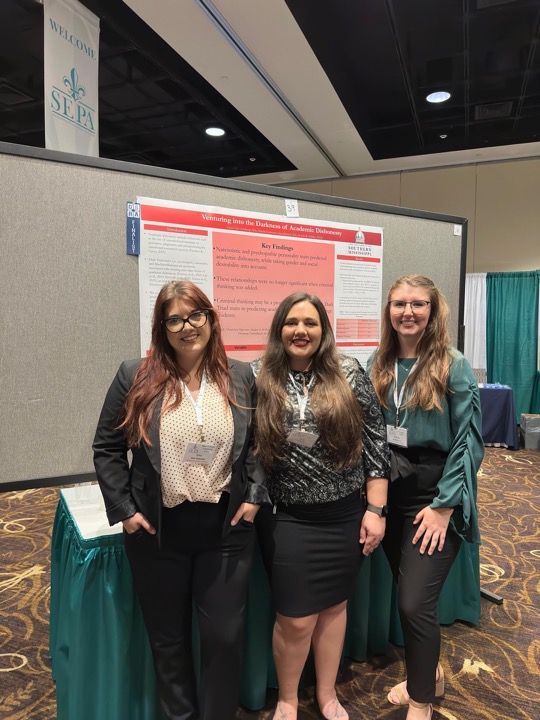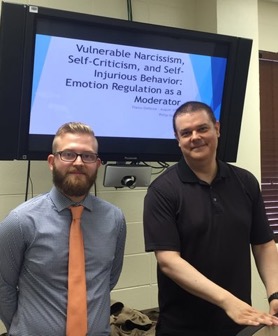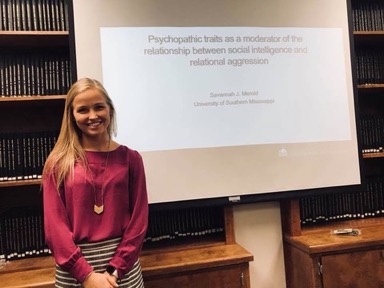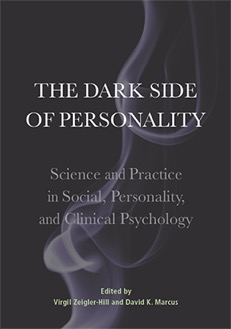
Director: Eric R. Dahlen, Ph.D.
Personality
Yuxuan Yang Proposes Thesis
04/25/24
Yuxuan (April) Yang, a first-year doctoral student working in the lab, successfully proposed her master’s thesis this week. April's thesis will examine the role of broad personality traits and authoritarianism in attitudes toward police legitimacy. There has been surprisingly little research in this area, and we are curious to know whether individual differences in personality traits should be considered in future work on attitudes toward police. April should learn a great deal from her study that may be useful in developing her dissertation.
Congratulations to April on her successful proposal!
Congratulations to April on her successful proposal!
Summer Steely Proposes Thesis
08/05/23
Summer Steely, a doctoral student working in the lab, successfully proposed her master’s thesis yesterday. Summer’s thesis will focus on determining whether moral foundations theory (Haidt & Joseph, 2007) has utility in understanding social aggression in the context of psychopathic personality traits and moral disengagement. Moral foundations theory is a new area of study in the lab, and we are looking forward to learning more about how it may be relevant to many of the areas we have been studying.
Congratulations to Summer on her successful thesis proposal!
Congratulations to Summer on her successful thesis proposal!
Three Students Win Graduate Student Research Award at SEPA
04/11/23

Pictured left to right: Erica Van Overloop, Jacq Strowd, and Nicole Kollmann in front of their poster
The Counseling Psychology programs at the University of Southern Mississippi were well-represented at the 69th annual meeting of the Southeastern Psychological Association (SEPA) in New Orleans this year. Three students in the lab won a Graduate Student Research Award for their poster: Erica Van Overloop, Nicole Kollmann, and Jacq Strowd. Congratulations!
The poster presented some results from a recent study examining dark personality traits and criminal thinking as predictors of academic misconduct among college students. Narcissistic and psychopathic personality traits predicted academic dishonesty while taking gender and social desirability into account. Criminal thinking appeared to be a better predictor because once it was entered into the model narcissistic and psychopathic traits were no longer significant.
Van Overloop, E., Kollmann, N., Strowd, J., & Dahlen, E. R. (2023, April 5-8). Venturing into the darkness of academic dishonesty [Poster presentation]. 66th Annual Convention of the Southeastern Psychological Association, New Orleans, LA, United States.
Jacqueline Strowd Completes Master's Project
07/25/22
Jacqueline Strowd successfully completed her master’s project and is now working on her dissertation proposal. Jacq’s master’s project examined a number of personality traits with either theoretical or empirical significance as possible predictors of academic dishonesty among college students. While most of the predictors she examined were positively related to academic dishonesty, psychopathic and Machiavellian personality traits were the only significant predictors in her regression model. Her secondary analyses identified one component of psychopathy and another of Machiavellianism that accounted for most of these relationships.
Jacq did a great job with her master’s project, and is planning to continue this line of research in her dissertation. Congratulations on finishing this project and moving on to the next step!
Jacq did a great job with her master’s project, and is planning to continue this line of research in her dissertation. Congratulations on finishing this project and moving on to the next step!
Philip Stoner Defends Dissertation
02/11/22
Philip Stoner, an advanced doctoral student currently completing his predoctoral internship at the Federal Correctional Complex in Petersburg, VA, successfully defended his dissertation today. Philip’s study utilized structural equation modeling to test key components of Hooley and Franklin’s (2018) benefits and barriers model for non-suicidal self-injury (NSSI). Using a sample of college women, he found that adverse childhood experiences predicted NSSI and that this relationship was partially mediated by self-esteem, peer-bonding motivation, and shame. Philip followed this analysis with invariance testing to examine the moderating influence of both grandiose and vulnerable narcissism. His findings have many interesting implications that should be helpful for mental health professionals working with college students.
Congratulations to Philip on a very impressive defense!
Congratulations to Philip on a very impressive defense!
Savannah Merold Proposes Dissertation
07/10/20

Building on her thesis work, she plans to use vignettes to activate mate-seeking and status motives and examine how the dark personalty traits predict participants’ responses. Gender will also be included, as it is expected that women and men may respond differently.
Congratulations to Savannah on the successful proposal!
Philip Stoner Proposes Dissertation
05/06/20

Of particular relevance to our work in the lab and building on his prior thesis work, Philip plans to incorporate grandiose and vulnerable narcissism as potential moderators of some of the expected relationships he will be testing between theoretically relevant predictors and NSSI.
Much like Ali’s recent thesis defense, Philip’s dissertation proposal took place online through Microsoft Teams. Everything worked as intended, and one would never had guessed that he hadn’t presented like this before.
Congratulations to Philip on the successful proposal!
Savannah Merold Defends Thesis
10/21/18

Social intelligence and psychopathic traits were related to the perpetration of relational aggression, with social intelligence having a negative relationship and psychopathic traits having a positive relationship. Psychopathic traits moderated the relationship between social intelligence and relational aggression so that it became stronger as psychopathic traits increased. Some of Savannah’s findings differed from what was predicted, but since she included some additional variables beyond what we used for her thesis, we hope to run some additional analyses to learn more about the possible role of social intelligence and psychopathic traits in relational aggression.
Congratulations to Savannah on the successful thesis defense!
Philip Stoner Defends Thesis
08/23/18

He found that vulnerable narcissism was positively related to both self-injury and self-criticism and that difficulties in emotion regulation moderated the relationship between vulnerable narcissism and self-criticism. Specifically, the relationship between vulnerable narcissism and self-criticism was stronger at higher levels of emotion dysregulation. Although some of Philip’s results were unexpected and may lead us to carry out additional analyses on his data, his thesis should be useful in informing the development of his dissertation. For his dissertation, Philip has expressed interest in studying the constellation of personality traits referred to as the Vulnerable Dark Triad (i.e., borderline personality, vulnerable narcissism, and secondary psychopathy).
What is the Dark Triad?
11/12/17
We are simultaneously drawn to and repelled by sensationalized stories of serial killers and mass murderers, seeking to understand how one of our fellow humans could commit such atrocities against innocent victims. Are these offenders vastly different from us in their genes, early environment, and/or recent life stressors, or are we all capable of such cruelty under the right set of circumstances? We wonder about what dark aspects of the human personality might be involved in such horrific acts. The question of why people violate social norms, commit moral transgressions (e.g., deceit, manipulation), and inflict harm on others has long intrigued psychologists and the public alike.
The Dark Triad refers to three overlapping but distinct personality traits associated with a variety of antisocial and morally transgressive behaviors: psychopathy, narcissism, and Machiavelianism (Paulhus & Williams, 2002). Considered together, these traits involve emotional coldness, a lack of empathy, the desire for personal advancement at the expense of healthy relationships, grandiosity, and a willingness to manipulate others (Jonason, Lyons, Bethell, & Ross, 2013). Although there are well-known clinical manifestations of psychopathy and narcissism, work on the Dark Triad has emphasized the goal of understanding the subclinical forms of these traits found throughout the population (Furnham, Richards, & Paulhus, 2013). That is, most of the Dark Triad research seeks to understand the dark personalities we encounter in our daily lives.
Psychopathy
Psychopathy describes a specific constellation of affective, interpersonal, lifestyle, and behavioral characteristics. These include impulsivity; callous affect; poor reliability in performing various roles; a lack of remorse, empathy, or guilt; and a tendency toward rule violation (Hare, 2003; Jones & Paulhus, 2014). Although psychopathy is associated with criminality and violence (Hare & Neumann, 2009) and is considered to be the most dangerous of the Dark Triad traits, its utility is not restricted to criminal and forensic contexts. For example, subclinical psychopathy predicts a variety of behaviors that are not necessarily criminal (e.g., academic dishonesty, relational aggression, cyber aggression, substance misuse) but still likely to be of interest (Kokkinos, Antoniadou, & Markos, 2014; Williams, Paulhus, & Hare, 2007).
Narcissism
Much like the clinical version (i.e., Narcissistic Personality Disorder), subclinical narcissism involves grandiosity, as well as entitlement and a sense of superiority; however, this grandiose narcissism is only one part of the construct. Another important aspect involves narcissistic vulnerability, which refers to a vulnerable self-concept and efforts at self-enhancement (Morf & Rodenwalt, 2001). While grandiose narcissism tends to be emphasized in much of the Dark Triad literature, vulnerable narcissism appears to be relevant in many areas of emotional and interpersonal functioning. Subclinical narcissism has been linked to aggression (Bushman & Baumeister, 1998), online antisocial behavior (Carpenter, 2012), and a number of other variables of interest.
Machiavellianism
Machiavellianism is probably the least understood of the Dark Triad traits. It refers to a manipulative interpersonal style named for Niccolò Machiavelli (Christie & Geis, 1970). In The Prince (1513), Machiavelli described several behaviors most of us would regard as immoral (e.g., lying, deceit, and even murder) as effective strategies for a ruler to maintain power. Machiavellianism is perhaps best characterized as the perspective that the ends justify the means. People high in Machiavellian traits are described as cynical on morality, focused on personal gain, and willing to manipulate and exploit others to achieve their goals (Jones & Paulhus, 2009). Machiavellian personality traits have been linked to online relational aggression (Abell & Brewer, 2014) and a number of other antisocial behaviors.
At the Anger and Traffic Psychology Lab, our primary interest with regard to the Dark Triad traits involves their role in nonclinical populations (i.e., individuals in the community who are not currently receiving treatment for diagnosed personality disorders or other mental health problems) of emerging adults. That is, we are interested in how individual differences in scores on subclinical measures of Dark Triad traits relate to a variety of socially undesirable behaviors (e.g., overt and relational aggression, cyber aggression, dysfunctional anger expression, jealousy, academic dishonesty, aggressive driving) among young adults.
References
Abell, L., & Brewer, G. (2014). Machiavellianism, self-monitoring, self-promotion and relational aggression on Facebook. Computers in Human Behavior, 36, 258-262.
Bushman, B. J. & Baumeister, R. F. (1998). Threatened egotism, narcissism, self-esteem, and direct and displaced aggression: Does self-love or self-hate lead to violence? Journal of Personality and Social Psychology, 75, 219-229.
Carpenter, C. J. (2012). Narcissism on Facebook: Self-promotional and anti-social behavior. Personality and Individual Differences, 52, 482-486.
Christie R. & Geis F. L. (1970). Studies in Machiavellianism. New York: Academic Press.
Furnham, A., Richards, S. C., & Paulhus, D. L. (2013). The dark triad of personality: A 10 year review. Social and Personality Compass, 7, 199-216.
Hare, R. D. (2003). Manual for the Revised Psychopathy Checklist (2nd Edition). Toronto, ON, Canada: Multi-Health Systems.
Hare, R. D., & Neumann, C. S. (2009). Psychopathy: Assessment and forensic implications. The Canadian Journal of Psychiatry, 54, 791-802.
Jonason, P. K., Lyons, M., Bethell, E. J., & Ross, R. (2013). Different routes to limited empathy in the sexes: Examining the links between the Dark Triad and empathy. Personality and Individual Differences, 54, 572-576.
Jones, D. N., & Paulhus, D. L. (2014). Introducing the Short Dark Triad (SD3): A brief measure of dark personality traits. Assessment, 21, 28-41.
Jones, D.N., & Paulhus, D. L. (2009). Machiavellianism. In M.R. Leary & R.H. Hoyle (Eds.), Handbook of individual differences in social behavior. New York: Guilford.
Kokkinos, C. M., Antoniadou, N., & Markos, A. (2014). Cyber-bullying: An investigation of the psychological profile of university student participants. Journal of Applied Developmental Psychology, 35, 204-214.
Morf, C. C. & Rhodewalt, F. (2001). Unraveling the paradoxes of narcissism: a dynamic self-regulatory processing model. Psychological Inquiry, 12, 4, 177-196.
Paulhus, D. L., & Williams, K. (2002). The Dark Triad of personality: Narcissism, Machiavellianism, and psychopathy. Journal of Research in Personality, 36, 556-568.
Williams, K. M., Paulhus, D. L. & Hare, R. D. (2007). Capturing the four-factor structure of psychopathy in college students via self-report. Journal of Personality Assessment, 88, 205-219.
The Dark Triad refers to three overlapping but distinct personality traits associated with a variety of antisocial and morally transgressive behaviors: psychopathy, narcissism, and Machiavelianism (Paulhus & Williams, 2002). Considered together, these traits involve emotional coldness, a lack of empathy, the desire for personal advancement at the expense of healthy relationships, grandiosity, and a willingness to manipulate others (Jonason, Lyons, Bethell, & Ross, 2013). Although there are well-known clinical manifestations of psychopathy and narcissism, work on the Dark Triad has emphasized the goal of understanding the subclinical forms of these traits found throughout the population (Furnham, Richards, & Paulhus, 2013). That is, most of the Dark Triad research seeks to understand the dark personalities we encounter in our daily lives.
Psychopathy
Psychopathy describes a specific constellation of affective, interpersonal, lifestyle, and behavioral characteristics. These include impulsivity; callous affect; poor reliability in performing various roles; a lack of remorse, empathy, or guilt; and a tendency toward rule violation (Hare, 2003; Jones & Paulhus, 2014). Although psychopathy is associated with criminality and violence (Hare & Neumann, 2009) and is considered to be the most dangerous of the Dark Triad traits, its utility is not restricted to criminal and forensic contexts. For example, subclinical psychopathy predicts a variety of behaviors that are not necessarily criminal (e.g., academic dishonesty, relational aggression, cyber aggression, substance misuse) but still likely to be of interest (Kokkinos, Antoniadou, & Markos, 2014; Williams, Paulhus, & Hare, 2007).
Narcissism
Much like the clinical version (i.e., Narcissistic Personality Disorder), subclinical narcissism involves grandiosity, as well as entitlement and a sense of superiority; however, this grandiose narcissism is only one part of the construct. Another important aspect involves narcissistic vulnerability, which refers to a vulnerable self-concept and efforts at self-enhancement (Morf & Rodenwalt, 2001). While grandiose narcissism tends to be emphasized in much of the Dark Triad literature, vulnerable narcissism appears to be relevant in many areas of emotional and interpersonal functioning. Subclinical narcissism has been linked to aggression (Bushman & Baumeister, 1998), online antisocial behavior (Carpenter, 2012), and a number of other variables of interest.
Machiavellianism
Machiavellianism is probably the least understood of the Dark Triad traits. It refers to a manipulative interpersonal style named for Niccolò Machiavelli (Christie & Geis, 1970). In The Prince (1513), Machiavelli described several behaviors most of us would regard as immoral (e.g., lying, deceit, and even murder) as effective strategies for a ruler to maintain power. Machiavellianism is perhaps best characterized as the perspective that the ends justify the means. People high in Machiavellian traits are described as cynical on morality, focused on personal gain, and willing to manipulate and exploit others to achieve their goals (Jones & Paulhus, 2009). Machiavellian personality traits have been linked to online relational aggression (Abell & Brewer, 2014) and a number of other antisocial behaviors.
At the Anger and Traffic Psychology Lab, our primary interest with regard to the Dark Triad traits involves their role in nonclinical populations (i.e., individuals in the community who are not currently receiving treatment for diagnosed personality disorders or other mental health problems) of emerging adults. That is, we are interested in how individual differences in scores on subclinical measures of Dark Triad traits relate to a variety of socially undesirable behaviors (e.g., overt and relational aggression, cyber aggression, dysfunctional anger expression, jealousy, academic dishonesty, aggressive driving) among young adults.
References
Abell, L., & Brewer, G. (2014). Machiavellianism, self-monitoring, self-promotion and relational aggression on Facebook. Computers in Human Behavior, 36, 258-262.
Bushman, B. J. & Baumeister, R. F. (1998). Threatened egotism, narcissism, self-esteem, and direct and displaced aggression: Does self-love or self-hate lead to violence? Journal of Personality and Social Psychology, 75, 219-229.
Carpenter, C. J. (2012). Narcissism on Facebook: Self-promotional and anti-social behavior. Personality and Individual Differences, 52, 482-486.
Christie R. & Geis F. L. (1970). Studies in Machiavellianism. New York: Academic Press.
Furnham, A., Richards, S. C., & Paulhus, D. L. (2013). The dark triad of personality: A 10 year review. Social and Personality Compass, 7, 199-216.
Hare, R. D. (2003). Manual for the Revised Psychopathy Checklist (2nd Edition). Toronto, ON, Canada: Multi-Health Systems.
Hare, R. D., & Neumann, C. S. (2009). Psychopathy: Assessment and forensic implications. The Canadian Journal of Psychiatry, 54, 791-802.
Jonason, P. K., Lyons, M., Bethell, E. J., & Ross, R. (2013). Different routes to limited empathy in the sexes: Examining the links between the Dark Triad and empathy. Personality and Individual Differences, 54, 572-576.
Jones, D. N., & Paulhus, D. L. (2014). Introducing the Short Dark Triad (SD3): A brief measure of dark personality traits. Assessment, 21, 28-41.
Jones, D.N., & Paulhus, D. L. (2009). Machiavellianism. In M.R. Leary & R.H. Hoyle (Eds.), Handbook of individual differences in social behavior. New York: Guilford.
Kokkinos, C. M., Antoniadou, N., & Markos, A. (2014). Cyber-bullying: An investigation of the psychological profile of university student participants. Journal of Applied Developmental Psychology, 35, 204-214.
Morf, C. C. & Rhodewalt, F. (2001). Unraveling the paradoxes of narcissism: a dynamic self-regulatory processing model. Psychological Inquiry, 12, 4, 177-196.
Paulhus, D. L., & Williams, K. (2002). The Dark Triad of personality: Narcissism, Machiavellianism, and psychopathy. Journal of Research in Personality, 36, 556-568.
Williams, K. M., Paulhus, D. L. & Hare, R. D. (2007). Capturing the four-factor structure of psychopathy in college students via self-report. Journal of Personality Assessment, 88, 205-219.
Savannah Merold Proposes Thesis
10/05/17

There is reason to believe that social and emotional intelligence are positive predictors of relational aggression, and some have suggested that certain levels of these forms of intelligence might be necessary for relational aggression to occur (or at least to be successful). At the same time, there is no reason to think that social or emotional intelligence would be sufficient to produce relational aggression. Thus, we plan to examine the degree to which psychopathic traits might inform our understanding of this relationship.
Congratulations to Savannah on a successful thesis proposal!
The Dark Side of Personality
08/11/17
I recently picked up a copy of The dark side of personality: Science and practice in social, personality, and clinical psychology, edited by Zeigler-Hill and Marcus (2016). As you can likely infer from the title, it focuses on dark personality traits, starting with the Dark Triad but including others (e.g., sadism, spitefulness, authoritarianism). What is less apparent from the title is just how far beyond the traditional dark personality variables the book goes, addressing topics around the periphery of dark personality (e.g., self-esteem, dependency, urgency). I was pleasantly surprised at how much more comprehensive it was than what I was expecting.
The book is easy to recommend to anyone wanting to improve their knowledge of dark personality research. Here are a few of the things I found most impressive:
The book is easy to recommend to anyone wanting to improve their knowledge of dark personality research. Here are a few of the things I found most impressive:
- Many of the most influential researchers in the dark personality literature contributed chapters to the book, providing an excellent representation of the scope and complexity of this area of study.
- Readers are presented with information on both the adaptive and maladaptive features of each dark personality trait. This provides important context and helps one reconcile what can sometimes appear to be inconsistent findings in the literature.
- Dark personality traits are addressed in the larger context of broad models of personality (e.g., the Five Factor Model). Again, this helps readers new to the dark personality literature understand how these traits fit into systems with which they will be more familiar.
- The book is organized using some of the recent work on pathological personality traits reflected in DSM-5. This is effective here because it helps the reader group variables that might not initially seem connected into broader domains.


